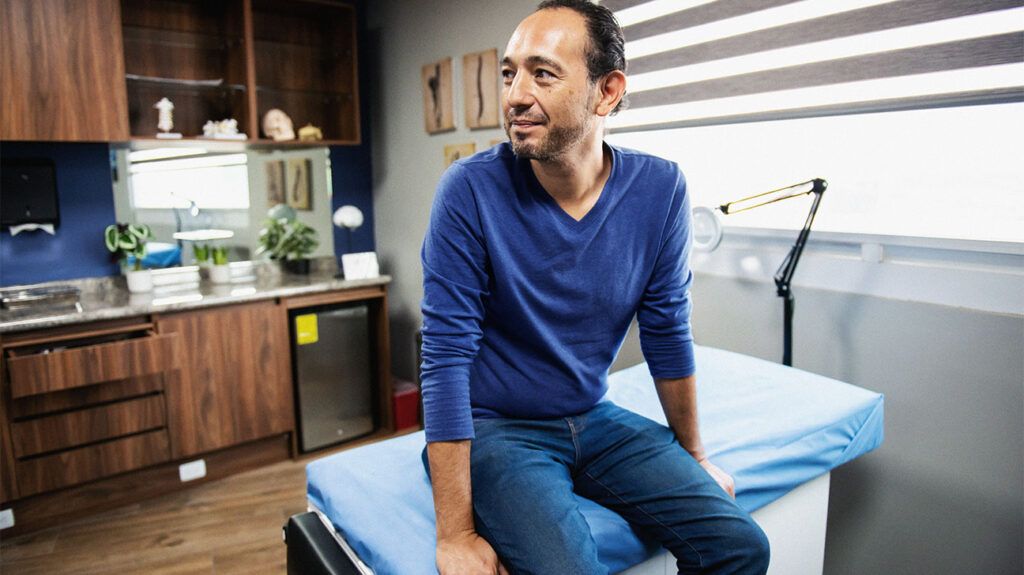Testosterone is a hormone that can help prostate cancer cells grow. Stopping testosterone from reaching prostate cancer cells can slow and shrink the cancer. Doctors can do this with a treatment known as hormone therapy.
Due to the effects of testosterone, there has been concern about whether testosterone replacement therapy — a form of treatment for people with low testosterone levels — could increase the risk of prostate cancer. At present, studies suggest this may not be the case.
This article examines the relationship between testosterone and prostate cancer. It also looks at what hormone therapy involves.

Testosterone is a sex hormone, also known as an androgen. Androgens help the prostate gland to work properly.
Androgens can also
Does testosterone cause cancer to grow?
Testosterone can cause prostate cancer cells to grow, as can other androgens, such as dihydrotestosterone, known as DHT.
As a result, when doctors are treating prostate cancer, they may aim to reduce androgen levels alongside other therapies or surgery.
Hormone therapy, also known as androgen deprivation therapy, is a form of treatment that either lowers androgen levels or reduces their effects on cell growth.
There are
- Reducing how many androgens the testicles produce: Doctors can achieve this with drugs called luteinizing hormone-releasing hormone (LHRH) agonists and LHRH antagonists. A permanent method is through surgery to remove the testicles, also known as orchiectomy.
- Blocking other parts of the body from producing androgens: Specific drugs can block androgen production elsewhere in the body. These include abiraterone (Zytiga) and ketoconazole (Nizoral).
- Stopping androgens from working: There is a range of drugs that prevent androgens from connecting to the proteins in prostate cells. These are known as anti-androgens or androgen receptor antagonists.
Doctors typically use hormone therapy alongside other treatments for prostate cancer. These other approaches include:
- before radiation therapy, shrinking the cells and making them easier to treat
- alongside radiation therapy for prostate cancer that has not spread and has a high risk of coming back
- when prostate cancer is still present or has come back after treatment
- when cancer has spread too far for surgery or radiation therapy to treat it
- when someone is unable to have surgery or radiation therapy
In time, many prostate cancer cells stop responding to hormone therapy. When this occurs, doctors may use a number of other drugs to treat the cancer. However, they will often continue using hormone therapy to keep androgen levels down at this time.
Learn more about hormonal and nonhormonal treatments for prostate cancer.
If someone has prostate cancer that is
Some doctors believe that starting early with hormone therapy is best, with some studies suggesting it may lead to more positive outcomes.
However, this is the
Read about what happens if hormone therapy stops working.
The
- reduced tumor growth
- improved survival rates
- relief of prostate cancer symptoms
Hormone therapy also increases the likelihood of other treatment options, such as radiation therapy, being effective. This is because it can slow the growth and even shrink tumors.
Some forms of hormone therapy are less invasive than other treatment options. Many involve taking pills
Can you take testosterone if you previously had cancer?
While testosterone can increase the growth of prostate cancer cells, conditions such as hypogonadism benefit from people taking testosterone.
Do cancer survivors have low testosterone?
Some cancer survivors may have low testosterone levels. This is because of the effects of treatments such as chemotherapy and hormone therapy.
Does testosterone cause prostate cancer recurrence?
Testosterone does not cause recurrent prostate cancer. The disease can return if some cancer cells remain after treatment or if some spread to a different part of the body before treatment.
Learn more about metastatic prostate cancer.
Testosterone is an androgen that can help prostate cancer cells grow. By reducing the production of testosterone and other androgens as well as blocking their effects, doctors can slow the growth of prostate cancer.
Hormone therapy is the name for treatment that reduces testosterone production or stops it from working. Doctors often use it before or alongside other forms of treatment to make them more effective.
While testosterone can play a role in the growth of cancer cells, research also suggests that testosterone replacement therapy does not increase a person’s risk of developing new or recurrent prostate cancer.
